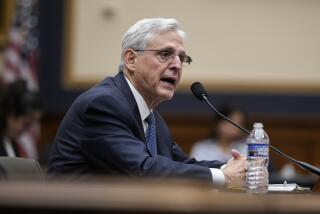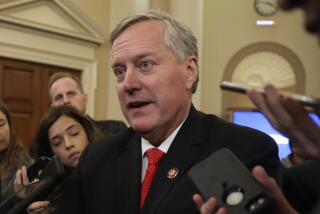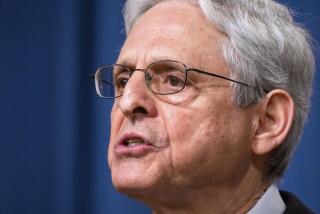Mukasey seen as his own man
By all accounts, Michael B. Mukasey is not someone who is easily intimidated.
As a federal judge, he stared down convicted terrorists. He presided over a fiercely independent Manhattan federal court nicknamed the “Sovereign District of New York.” He is little interested in politics or politicians.
And if confirmed as attorney general, his independent streak could pose problems for President Bush.
With his reputation already well-established and a gig at the Justice Department expected to last no more than a year or so, Mukasey, at 66, has little to lose. As a result, observers think he’ll view his role much differently than did his predecessor as attorney general, Alberto R. Gonzales, who developed a reputation as a loyal advocate for administration legal positions and policies.
Although Mukasey would be in the Bush Cabinet and be expected to be part of the team, those who know him say he would not hesitate to bring his considerable legal heft to bear if he believed Bush was not following the law. This could cause Bush some uncomfortable moments, especially in dealing with Congress in the ongoing probes of the Justice Department and White House.
“He is not going to be pushed around,” said Bruce Ackerman, a Yale Law School professor who was a classmate there with Mukasey in the 1960s. “He is very much a serious judge. The administration cannot afford to antagonize him.”
Some who have known Mukasey for years wonder whether Bush really knows what he is getting into. “If I were George W. Bush, I never would have picked Michael Mukasey,” said Edward M. Shaw, a former colleague of Mukasey at the U.S. attorney’s office in Manhattan.
On Friday, Bush officially launched the confirmation process, sending Mukasey’s name to the Senate to succeed Gonzales, Bush’s longtime friend and advisor. A former prosecutor himself and a judge for nearly two decades, Mukasey is widely viewed as a man of integrity. Despite conservative leanings, he has won early support from Democrats as well as Republicans.
Nevertheless, Mukasey may face tough questions from Democrats about his conservative views on national security versus civil liberties. The Senate has not scheduled confirmation hearings; Judiciary Committee Chairman Sen. Patrick J. Leahy (D-Vt.) has threatened to delay the hearings if the White House continues to withhold documents and testimony related to the committee’s investigation of the Justice Department.
--
Firm stances
In rounds of meetings with lawmakers late last week, Mukasey made it clear that he would fire any Justice Department employee who discussed sensitive cases with anyone at the White House. Under Gonzales, a pipeline developed between Justice and White House officials that critics believe opened the way to abuse. Mukasey also said that politicians calling the Justice Department would be given only two phone numbers -- his and that of his top deputy.
He is also expected to face demands from Democrats to appoint a special prosecutor to investigate whether crimes were committed in connection with the firing last year of nine U.S. attorneys. An internal Justice Department probe into the matter is already underway. It is far from clear what Mukasey will do on that score, although some note he hails from the same New York legal circles that produced former Deputy Atty. Gen. James B. Comey, who in 2003 appointed a special prosecutor to investigate the White House’s involvement in the CIA leak case.
Mukasey could also have an effect on other Bush administration policies, including the 2-decade-old system under which criminals are sentenced in federal court. Gonzales was a strong proponent of strict guidelines that gave judges little discretion in sentencing. While on the bench, Mukasey was among a number of judges who thought that the guidelines, and the limits they placed on the power of the courts, violated the principle of separation of powers under the Constitution.
In 2003, when Congress enacted a law that required judges to report every case in which they ordered a sentence below the guidelines, Mukasey was among those threatening revolt. “They can have their blacklist,” he declared in an interview. “But we have life tenure.”
To be sure, Mukasey seems to think like Bush on many issues that Bush cares about. Mukasey is a relative hawk on national security matters and has supported aggressive measures in the war on terrorism. He approved the rounding up of scores of illegal immigrants after the Sept. 11 attacks with a controversial form of warrant that allowed their incarceration because they may have been witnesses to crimes. He has defended the Patriot Act and derided some of its major critics, including librarians who have said the law threatened citizens’ 1st Amendment rights.
Interviews with several dozen people, including former prosecutors and judges, as well as attorneys who appeared before Mukasey when he was a judge and have worked beside him as a lawyer, present a picture of a thoughtful person who never shoots from the hip and who is not above recognizing his mistakes and correcting them. Not all lawyers agree with him, but they all seem to agree that he gives them a fair shake.
“This guy is not a lefty, he’s not a progressive, he’s not a liberal,” said Stanley Cohen, who has defended alleged terrorists in New York and is concerned about the “love fest” that has arisen over the announcement of Mukasey’s appointment, particularly among some liberal Democrats. But “he does express some independent thought,” Cohen said.
As an example, Cohen recalled a case he had before the judge in the 1990s. The defendant was a man who refused to testify before a federal grand jury about why his name showed up as cosigner to a checkbook belonging to the political director of Hamas, the militant Palestinian group identified by the United States and others as a terrorist organization. The refusal meant that Mukasey could hold the man in jail for 18 months or until the end of the grand jury’s term, in the hopes that that would persuade him to talk.
But, Cohen said, “after three or four months he let him out. He applied the law strictly and found there was a zero chance that this guy sitting in jail would change his mind.”
Jeffrey G. Smith, a New York securities lawyer, tried to have the judge taken off a case that he filed in the mid-1990s against Philip Morris Cos. The suit alleged that the company had defrauded investors by hiding evidence that it had manipulated nicotine levels in cigarettes in order to hook smokers.
He asked for the recusal after Mukasey revealed that as a young lawyer in the 1960s, he had done work defending tobacco companies against suits by smokers with lung cancer. “He denied my motion, saying [his prior work] was so long ago that it would not affect his judgment,” Smith said. “Boy, was I glad he did.”
With Mukasey overseeing the class-action suit, Smith eventually won a more than $100-million settlement from the tobacco company for investors.
--
Path to the bench
A native New Yorker, Mukasey graduated from Columbia University and Yale Law School, where he made law review and earned a reputation as a deft editor of student writings on patent law and other obscure points of law.
After law school, he joined a New York firm, Webster Sheffield, and as a young associate helped successfully defend liability suits against Liggett & Myers Tobacco Co., the firm’s biggest client.
He left the firm in 1972 to take on corrupt cops and politicians as an assistant in the U.S. attorney’s office in Manhattan, where he met an aspiring young prosecutor by the name of Rudolph W. Giuliani, who remains one of his closest friends.
A few years later, Mukasey and Giuliani joined the firm of Patterson, Belknap, Webb & Tyler, which was noted for representing Dow Jones & Co. and the New York Daily News. Mukasey defended, among others, reporters in legal jams, including a Daily News writer who had printed secret grand jury testimony about associates of former New York Yankee Joe Pepitone, on trial for drug charges in the mid-1980s.
Mukasey spent 12 years at the firm before President Reagan named him to the bench in 1987.
He seemed immediately comfortable there.
“Typically when you appear before new judges, they are a little bit unsure of themselves,” said Robert Cleary, a New York lawyer and former prosecutor who handled a major arson and insurance case before Mukasey in 1988 not long after the judge had been appointed. “You would have thought he was on the bench for 15 years.”
--
A formative trial
In his judicial chambers, Mukasey kept photos of personal heroes, including George Orwell -- “a particular idol of mine for his clear writing and complete disdain for cant,” he once said -- and former Supreme Court Justice Robert H. Jackson, known as one of the great stylists in high court history, who also wrote an influential opinion on the limits of executive power, a subject of no small interest to the Bush administration.
Visitors also could find a bulletproof vest on a hanger in his office, a vestige of the lengthy terrorism trial in 1996 of the radical Egyptian cleric Omar Abdel Rahman, the “blind sheik,” whom he sentenced to life in prison for masterminding a plot to destroy New York City landmarks, including the United Nations building.
Mukasey’s friends say the experience dramatically reshaped his view of the world and his life.
“Before 9/11, people didn’t connect the dots; it wasn’t in people’s consciousness,” said Kenneth J. Bialkin, a New York lawyer and longtime friend of Mukasey’s. “But in the course of that trial there was clear evidence that began to show these were not just isolated fanatics. They were part of a doctrine. And he came to see that.”
The trial also deeply affected him on a personal level because of the heavy security contingent he and his family were given until his retirement from the bench last year. Guards moved into his home, taking over a spare room. “His house was wired and ringed,” Bialkin said. They also “pitched a trailer” next to his country home outside the city.
Though he is widely viewed as pro-government, he has also lashed out at prosecutors who he thinks are ill-prepared or trying to pull one over on the court.
New York attorney Donna R. Newman represented alleged “dirty bomber” Jose Padilla when he was held incognito on a material witness warrant in Manhattan in 2002. For months she was denied access to her client; then Mukasey issued two landmark rulings: one, that the government could indeed hold Padilla as an unlawful combatant; and the other, most important to Newman, that she had a right to meet with Padilla.
Yet after the rulings, she said, federal prosecutors still refused to let her see Padilla. “They kept dragging their feet,” she recalled. “It was one thing after another.
“And he came down very hard on them. He told them an order was an order; do it!”
--
richard.serrano@latimes.com
More to Read
Start your day right
Sign up for Essential California for news, features and recommendations from the L.A. Times and beyond in your inbox six days a week.
You may occasionally receive promotional content from the Los Angeles Times.







